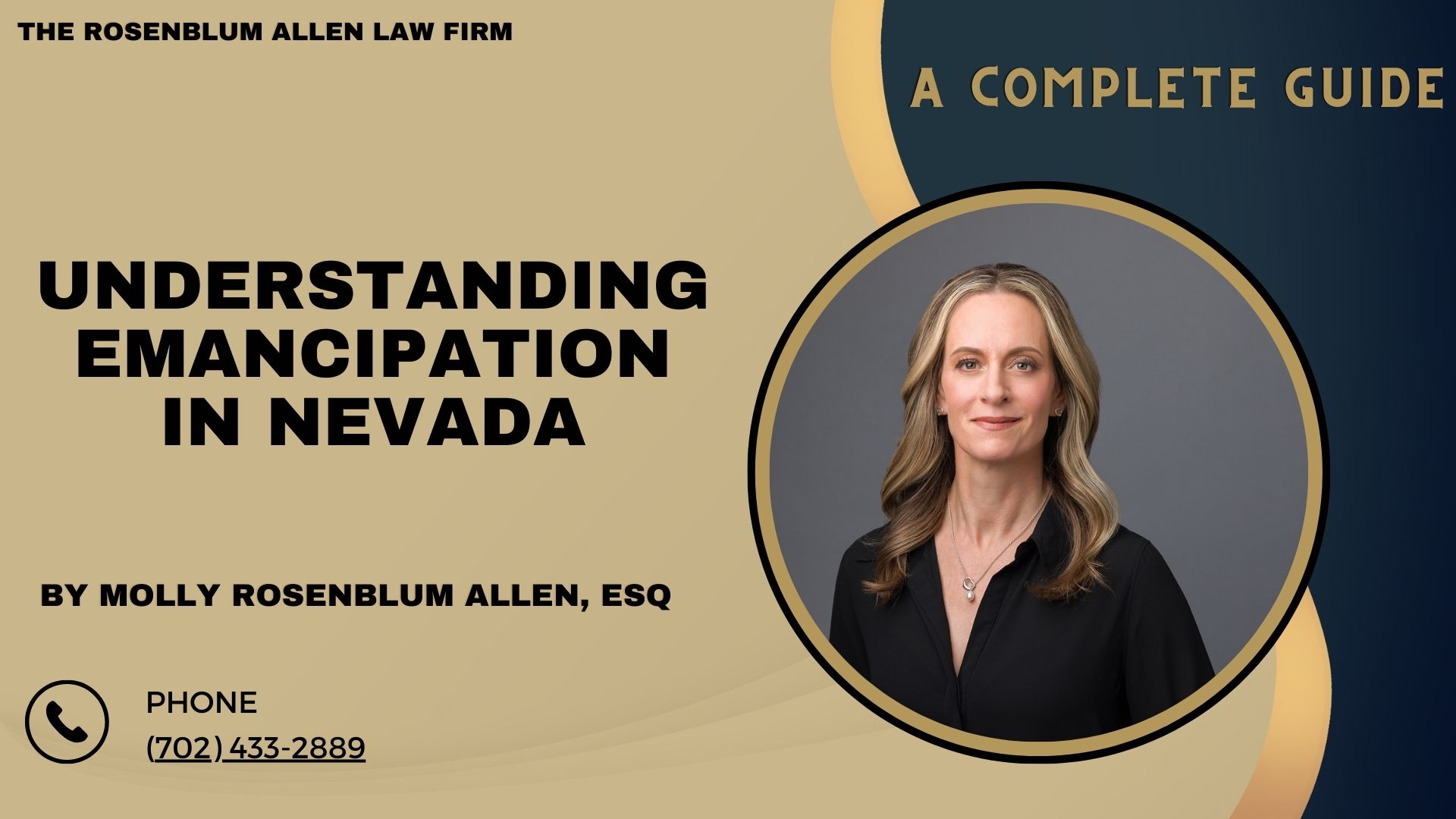Emancipation is a big legal process. It impacts the lives of many young people in Nevada. It’s a step towards independence. But, it comes with responsibilities that need careful thought. This guide covers what emancipation Nevada entails. It caters to the residents of Nevada. It is here to help you. It will guide you if you are seeking more freedom or trying to understand the law.

 What is Emancipation?
What is Emancipation?
Definition and Legal Standing
Emancipation is a legal process. It grants minors most of the rights and duties of adults before they turn 18, the age of majority in Nevada. This process legally recognizes the minor as an adult for many purposes. They include the ability to make their own decisions about money. They can also make decisions about living and healthcare.
The Concept of Emancipation Nevada
In simple terms, emancipation is like turning 18 overnight — at least in the eyes of the law. It’s a big step that says, “I’m ready to be responsible for myself.”
How Emancipation Affects Minors’ Rights and Responsibilities
Once free, a minor can make contracts. They can handle their finances, make medical decisions, and more. But, they also take on the duties that come with these rights. They must adhere to contracts and are liable for their actions.
Types of Emancipation Nevada
There are generally two types of emancipation recognized: full and partial.
Complete Emancipation: Grants a minor all an adult’s legal rights and responsibilities.
Partial Emancipation: Provides limited rights to a minor, including the ability to make medical decisions or consent to certain types of employment.

Legal Requirements for Emancipation in Nevada
Age Requirements
A minor must meet specific age criteria for emancipation Nevada.
Minimum Age for Consideration: Generally, the minor must be at least 16 to petition for emancipation, though exceptions can apply in certain circumstances.
Legal Grounds for Emancipation
Several conditions can serve as grounds for emancipation in Nevada. A minor must prove at least one of the following:
Financial Independence: Ability to support oneself financially without parental aid.
Marriage: Minors who are legally married may seek emancipation.
Military Service: Active duty military service can also be a ground for emancipation.
The Application Process
Navigating the process for emancipation requires careful preparation. You must understand the legal steps involved.
Documentation Needed
The petition for emancipation must include specific documents. These include proof of age. They also need evidence of financial independence and reasons for seeking emancipation.
Filing the Petition
The minor must petition the court in their county of house. This document formally requests emancipation and outlines the minor’s case.
Court Hearings and Procedures
After you file, the court will schedule a hearing. During this hearing, the judge will review the petition. They will hear from the minor and maybe from their parents or guardians. Then, they will decide on the emancipation request.
Emancipation Nevada is more than just a legal formality. It’s a life-changing decision that brings new freedoms and duties. Young people can make informed decisions about their future. They can do this by understanding what, why, and how to get emancipated in Nevada. In the next sections, we will look at the good and bad of emancipation. We will guide you through applying and what to expect after it’s granted.

Benefits and Limitations of Emancipation
Gaining independence through emancipation can feel freeing. But, it’s not easy. Let’s explore the advantages and disadvantages of obtaining emancipation.
Advantages of Being Emancipated
Emancipation can open many doors, granting you freedoms that were once out of reach. Here are a few key benefits:
Legal Independence: Say goodbye to needing parental consent for most decisions. You’re the captain of your ship now.
Ability to Enter Contracts: Whether it’s signing a lease for an apartment or buying a car, these agreements are now within your grasp.
Employment and Financial Decisions: You can work without restrictions applicable to minors and manage your finances, including opening bank accounts.
Disadvantages and Challenges
With great power comes great responsibility. Here are some of the challenges emancipated minors might face:
Financial Responsibility: Bills, rent, and taxes are now your show. Managing finances responsibly is critical.
Loss of Certain Protections: Being viewed as an adult means you lose certain protections afforded to minors, both legally and socially.

How to Apply for Emancipation in Nevada
Are you feeling ready to leap into independence? Let’s walk through the steps to apply for emancipation Nevada. It’s a journey that requires preparation, patience and a bit of paperwork.
Step-by-Step Guide
Preparing Your Case
Gather all necessary documentation and evidence to support your case for emancipation. This includes financial records, proof of income, and a plan for living independently.
Necessary Legal Documents
You’ll need to complete the Petition for Emancipation Nevada and other required forms. The forms vary by county. Check with your local court for the documents that are specifically needed.
Attending the Court Hearing
This is your moment to shine and present your case to a judge. Be prepared to say why freedom is best for you. Also, explain how you will support yourself.
Seeking Legal Advice
Navigating the legal process can be daunting, but you don’t have to do it alone.
The Role of Legal Counsel
A lawyer can give invaluable advice. They will ensure that they strengthen your petition and protect your rights. They can also represent you during the court hearing.
Finding a Lawyer Specialized in Emancipation Nevada
Look for attorneys with experience in family law or, specifically, emancipation Nevada cases. Many legal aid organizations offer services at reduced rates. They are accessible to those who qualify.

After Emancipation: Rights and Responsibilities
Congratulations, you’ve been granted emancipation! Now what? Let’s break down the newfound rights and responsibilities of this status.
Legal Rights of Emancipated Minors
Contractual Rights: You can now enter into contracts on your behalf.
Employment and Income: Work without hour restrictions and manage your earnings.
Education and Healthcare Decisions: Make decisions about your education and medical care without parental consent.
Obligations and Legal Responsibilities
Financial Obligations: Paying bills on time, managing a budget, and understanding taxes are now part of your world.
Criminal Liability: You will be held accountable for your actions in the adult legal system.
Emancipation in Nevada is a big step to adulthood. It brings both exciting freedoms and serious duties. Understanding the benefits, limitations, and process can help you make an informed decision. Seeking emancipation is a personal choice. You should think about it carefully. When possible, discuss it with trusted adults or lawyers.

Support Services and Resources in Nevada
Embarking on the journey of emancipation is a bold step towards independence. But, it’s important to remember that you’re not alone. Nevada offers many services and resources. They help young people during and after the process of emancipation.
Legal Aid and Advisory Services
Finding the proper guidance can make all the difference. Here are some places where emancipated minors can seek legal advice and support:
Nonprofit Organizations: Many organizations offer free or low-cost legal services to young people considering emancipation. They can advise, help with paperwork, and even represent you in court.
Governmental Assistance Programs: State and local agencies provide resources and counseling to ensure you understand your rights and obligations as an emancipated minor.
Educational Resources and Counseling Services
Adjusting to a new level of independence can be challenging. Thankfully, you can get educational and counseling services. They will help you navigate this new phase of life.
Workshops and Seminars: Look for local workshops covering financial literacy, legal rights, and life skills. These can be invaluable as you adapt to your new responsibilities.
Counseling and Support Groups: Emotional support is as important as legal advice. Counseling services and support groups for emancipated minors can offer a space to share experiences and find mutual support.

Breaking It All Down
Becoming emancipated is a big decision. It brings both freedom and duties. It’s a declaration of independence. But, it’s also a commitment to live up to the challenges and duties of being an adult in the eyes of the law.
To decide if this is right for you, understand how emancipation works in Nevada. Learn its benefits and limits, and where to find support and resources. Remember, seeking freedom is not just about gaining freedom from parents. It’s about proving to the world and to yourself that you can stand alone.
If you’re considering emancipation, take time to think about why. Also, think about your plans and the support you have. Emancipation is not just a legal process; it’s a stepping stone towards the rest of your life. Good preparation and guidance can be a decisive step. They lead to a successful and independent future. Remember, the path might be hard. But, Nevada has resources and support to help you.

Frequently Asked Questions
Can I still attend school if I’m emancipated?
Yes, you’re still required to attend school as an emancipated minor. Emancipation doesn’t exempt you from education laws, so continuing your education is crucial for your future.
How does emancipation affect my relationship with my parents?
Emancipation legally frees you from your parents’ control and responsibilities. However, it doesn’t automatically change personal relationships. You can maintain relationships with your parents as you see fit.
Are there age restrictions for working after emancipation?
Once emancipated, you can work without the restrictions placed on non-emancipated minors. However, you must still follow federal laws regarding hazardous jobs and work hours.
Can I get a driver’s license if I’m emancipated?
Yes, emancipated minors can apply for a driver’s license and must adhere to the same state laws as adults. You’ll need to meet all standard requirements and pass required tests.
Will I still be covered under my parents’ health insurance if I’m emancipated?
Emancipation may affect your eligibility for your parents’ health insurance. Many policies require dependents to be under a certain age and not emancipated. It’s essential to check with the insurance provider for specific policy rules.
Can emancipated minors rent an apartment or buy property?
Yes, emancipated minors have the legal authority to enter contracts, including signing leases or purchasing real estate if they have the necessary funds.
Do I need my parents’ consent to become emancipated?
No, you don’t need your parents’ consent to file for emancipation. However, they will be informed of the court proceedings and have the right to attend and express their views.
What happens if I can’t manage my finances after becoming emancipated?
Emancipation entails full responsibility for your finances. If you struggle, seek help from financial counseling services. You may need to reassess your living arrangements or expenses.
Is it possible to reverse emancipation?
In some cases, emancipation can be reversed by showing the court that returning to your parents or guardians is in your best interest. The process varies by state and requires a new court petition.
Can an emancipated minor still commit juvenile offenses?
While emancipated minors are often treated as adults for many purposes, they can still be charged with juvenile offenses if they’re under 18. The legal system treats adult criminal responsibility and the age of majority differently in specific contexts.

Glossary
- Emancipation: A legal process through which a minor gains independence from their parents or guardians, obtaining most rights and responsibilities of adulthood before reaching the age of majority.
- Age of Majority: The age at which a person is legally considered an adult capable of managing their affairs. In Nevada, this age is 18.
- Petition for Emancipation: A formal request filed in court by a minor seeking legal independence from their parents or guardians.
- Financial Independence: The ability to support oneself financially without assistance from parents, guardians, or government aid.
- Legal Capacity: The ability to enter into binding contracts, make certain legal decisions, and be held accountable.
- Court Hearing: A session held in court where the judge reviews the emancipation petition, hears from all parties involved and decides based on the evidence presented.
- Legal Aid: Professional legal services are provided at no cost or reduced cost to individuals who cannot afford to hire an attorney.
- Nonprofit Organizations: Organizations that operate for the public good without the intention of making a profit, often providing free or low-cost services, including legal assistance.
- Governmental Assistance Programs: Programs funded and administered by the government aimed to support individuals in need, including emancipated minors.
- Workshops and Seminars: Educational meetings or sessions focused on a particular subject, such as financial literacy or legal rights, designed to provide information and skills to participants.
- Counseling Services: Professional services offering advice, guidance, and support to help individuals deal with personal, social, or psychological challenges.
- Juvenile Offenses: Illegal acts committed by individuals who have not yet reached the age of majority are often dealt with through the juvenile justice system rather than the adult criminal court system.
- Financial Counseling: Services that provide education, resources, and personal counseling to help individuals manage their finances effectively, including budgeting, saving, and debt management.

Additional Resources for You
In your journey through legal challenges, it’s crucial to have reliable and comprehensive resources at your disposal. Our lead attorney, Molly Rosenblum Allen, Esq., has created an extensive suite of resources to assist you in your time of need. Whether you’re navigating family law issues, considering adoption, or need guidance on specific legal procedures in Nevada, these resources are designed to provide you with valuable information and support:
Las Vegas Family Law Attorneys: A dedicated team ready to assist with all facets of family law. Visit here
Family Court Las Vegas: Navigate the complexities of family court proceedings in Las Vegas with confidence. Learn more
Common Law Marriage in Nevada: Uncover the realities behind common law marriage in Nevada. Find out more
Name Change Las Vegas: Guidance on the legal process for changing your name in Las Vegas. Explore here
Nevada Power of Attorney: Essential information on assigning power of attorney within Nevada. Read more
How to File a Motion in Family Court: Step-by-step assistance on filing motions effectively in family court. Discover how
Family Court Mediation: Understanding the mediation process in family court to resolve disputes amicably. Learn about mediation
Unbundled Attorney: Explore flexible legal services tailored to meet your specific needs. Find out what it means
Nevada Adoption: Navigate the adoption process in Nevada with effective advice and support. Get informed
Molly Rosenblum Allen, Esq., and the team at The Rosenblum Allen Law Firm are committed to providing you with the knowledge and support you need during challenging times. These resources are a testament to our dedication to helping you understand and navigate the complexities of the legal system in Nevada.

Outside Resources for You
American Bar Association (ABA): A rich source of general legal information, including resources on family law and the rights of minors. Visit the ABA
FindLaw: Offers a wide range of articles and resources on family law, including emancipation and other topics relevant to minors seeking legal independence. Explore FindLaw
National Center for State Courts (NCSC): Provides information on court systems, including resources for understanding family law proceedings. Learn from NCSC
Child Welfare Information Gateway: Offers resources and information on children’s welfare, including legal issues and emancipation. Check out the Child Welfare Information Gateway
The Legal Aid Society: Although focused on providing legal services, their website contains information that can be helpful for individuals looking for guidance on various legal issues. Visit The Legal Aid Society
YouthLaw Center: Dedicated to advocating for the rights of young people, the YouthLaw Center provides resources and information relevant to emancipated minors and those seeking emancipation. Discover more at YouthLaw Center
National Association of Counsel for Children (NACC): An organization dedicated to improving the lives of children and families through legal advocacy. Their site offers resources and information on child welfare and legal rights. Learn more at NACC

A Special Message from Our Lead Attorney, Molly Rosenblum Allen, Esq

Thank you for taking the time to explore the resources we’ve curated for you. I hope you’ve found them insightful and beneficial for your current needs. Understanding the complexities of the legal system is daunting. This is especially true in areas like family law and emancipation. Still, you’re not alone in this journey. At The Rosenblum Allen Law Firm, my team and I are committed to assisting you. We will provide the support and expertise. You can use them to navigate your legal challenges with confidence.
Please contact us if you are ready to take these steps or if you have questions about your situation. Call (702) 433-2889 to connect with my team and me. Together, we can discuss the best way for your situation. Then, we can start getting your desired result.
Remember, empowering decisions are informed ones. We’re here to provide the guidance and representation you need to move forward.
Warmest regards,
Molly Rosenblum Allen, Esq.


